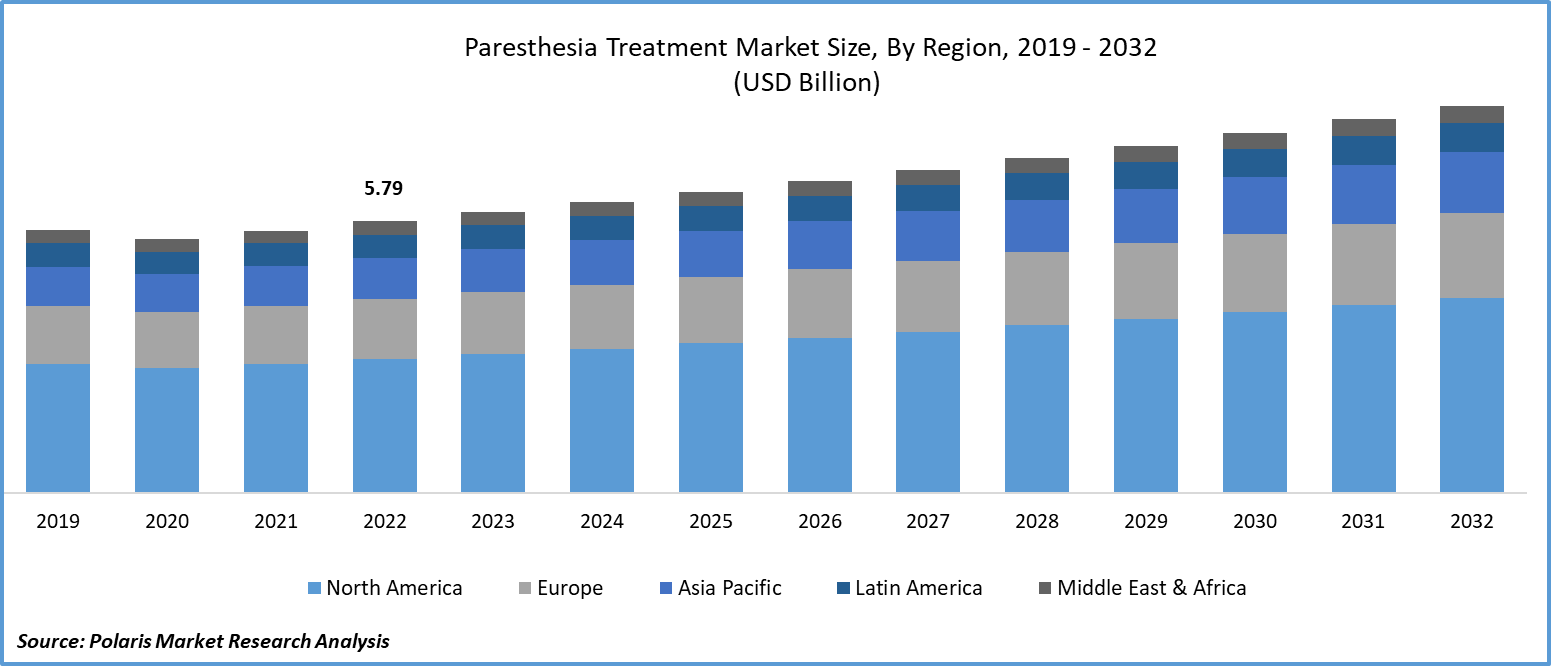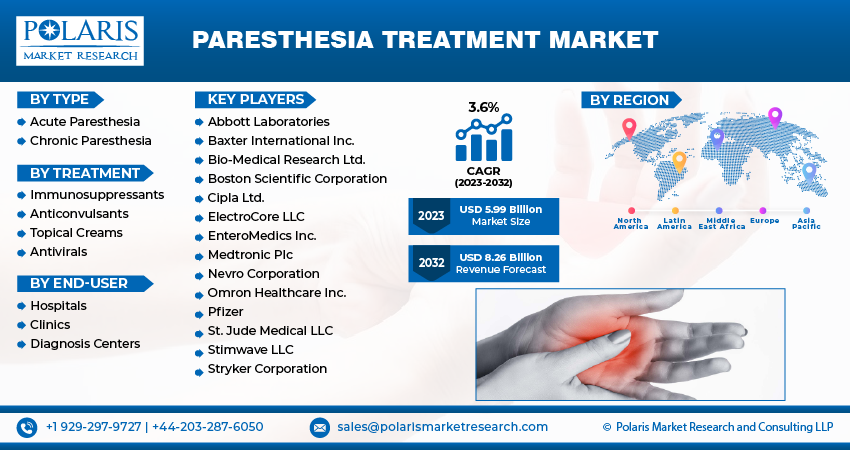
Paresthesia Treatment Market Share, Size, Trends, Industry Analysis Report, By Type (Acute Paresthesia, Chronic Paresthesia); By Treatment; By End-User; By Region; Segment Forecast, 2023 – 2032
- Published Date:Nov-2023
- Pages: 116
- Format: PDF
- Report ID: PM3991
- Base Year: 2022
- Historical Data: 2019-2021
Report Outlook
The global paresthesia treatment market was valued at USD 5.79 billion in 2022 and is expected to grow at a CAGR of 3.6% during the forecast period.
The significant increase in prevalence for various chronic disorders such as cancer, diabetes, and many others and continuous surge in the influence of paresthesia treatment all over the world, are major factors driving the global market growth. Beside this, the rapid advancements in medical equipment like transcutaneous electrical nerve stimulation devices and ultrasound and increased people awareness and knowledge about the availability and effectiveness of such treatment options, are likely to positively influence the global market growth.

To Understand More About this Research: Request a Free Sample Report
- For instance, the number of people suffering with diabetes are expected to reach over 1.31 billion people by 2050, with a significant increase in the prevalence from 529 million people in 2021. Also, the global expenditure of diabetes-related health is projected to rise to around USD 1054 billion by 2045.
Moreover, there has been a surge in the number of pharmaceutical companies across the world who are increasing their focus on researching and developing more effective medications to manage neuropathic pain and introducing new treatments for disease with enhanced capabilities and characteristics, which in turn, generating lucrative growth opportunities for the market over the coming years. For instance, in June 2023, Lupin Ltd., announced about the launch of its new numbness treatment injection in the United States in a partnership with the Caplin Steriles. The new injection is being used for the treatment of thiamine deficiency, that could lead to loss of weight and appetite, memory loss, muscle weakness, heart problems, and confusion, among others.

For Specific Research Requirements: Request for Customized Report
However, lack of curative treatments for paresthesia and high cost associated with the innovative treatments such as regenerative therapies and neuromodulation devices along with this several regulatory and reimbursement challenges, are among the major factors hampering the growth of the market.
The research study provides a comprehensive analysis of the industry, assessing the market on the basis of various segments and sub-segments. It sheds light on the competitive landscape and introduces Paresthesia Treatment Market key players from the perspective of market share, concentration ratio, etc. The study is a vital resource for understanding the growth drivers, opportunities, and challenges in the industry.
Industry Dynamics
Growth Drivers
- Rising incidences of neurological illnesses worldwide driving the global market growth
The global paresthesia treatment market is experiencing significant growth due to the rising incidences of neurological illnesses worldwide. Paresthesia, characterized by abnormal sensations like tingling, numbness, or burning in the body, is often associated with various neurological conditions, such as neuropathy, multiple sclerosis, and spinal cord injuries.
As the global population ages and the prevalence of conditions like diabetes and neurodegenerative diseases increases, the demand for paresthesia treatment is on the rise. This growth is further fueled by advancements in medical technology and the development of novel therapies and pharmaceuticals that aim to address the underlying causes of paresthesia.
Furthermore, the growing awareness about neurological disorders and the availability of effective treatments are driving patients to seek medical care, contributing to the market's expansion. Overall, the Paresthesia Treatment Market is positively influenced by the increasing incidence of neurological illnesses and the continuous efforts in research and innovation within the field.
Report Segmentation
The market is primarily segmented based on type, treatment, end-user, and region.
|
By Type |
By Treatment |
By End-User |
By Region |
|
|
|
|
To Understand the Scope of this Report: Speak to Analyst
By Type Analysis
- Chronic paresthesia segment accounted for significant market share in 2022.
The chronic paresthesia segment accounted for significant market share, that is mainly attributed to greater prevalence for various different chronic conditions like diabetes and peripheral neuropathy, among others along with the rising awareness among people about the chronic paresthesia and its potential impact of people’s quality life.
The acute paresthesia segment is expected to witness highest growth over the course of study period, mainly due to rapid increase in global aging population who are more likely to have conditions like nerve compression due to degenerative spinal conditions and arthritis. Beside this, rapid advancements in medical technology that leading to the development of more effective and less invasive treatment options for acute paresthesia, are also likely to spur segment market growth. According to the World Health Organization, the number of people aged over 60 years and above was around 1 billion in 2020 and is projected to reach over 1.4 billion people by 2030. And, the number of people aged 80 years or above will also double by 2050 with over 2.1 billion.
By Treatment Analysis
- Anticonvulsants segment held the significant market share in 2022
The Anticonvulsants segment held the majority market share in terms of revenue share in 2022, which is significantly driven by high effectiveness in managing neuropathic pain that often relates to paresthesia and its more favorable safety profile that makes them suitable for long-term use over other types of medications.
In addition, there is an increasing proliferation among leading pharmaceutical companies for investing heavily in the development of new anticonvulsant medications with improved efficacy and lesser side effects and are also exploring their use and potential with other treatments such as physical therapy and other types of medications, which in turn, likely to expand treatment options and further drive the anticonvulsant segment.
By End User Analysis
- Diagnosis centers segment is likely to witness highest growth over the forecasted period.
The diagnosis centers segment is projected to grow at highest growth rate over the next coming years, on account of growing number of diagnosis centers for such kind of treatments worldwide and surge in the awareness about several neurological disorders and paresthesia symptoms that resulted in a greater number of people seeking medical evaluation and diagnosis for the disorders as well.
The hospitals segment led the industry market with substantial share in 2022, which is majorly driven by presence of healthcare professionals like neurologists and neurosurgeons with expertise in neurology and nerve-related conditions and easier access to latest medical technologies to the hospitals. Apart from this, as hospitals are easily accessible and available near patient premises and have specialized pain management clinics, they are widely preferred by large patient pool, which have been fueling the segment market growth.
Regional Insights
- North America region dominated the global market in 2022
The North America region dominated the global market. The regional market growth is highly attributable to greater adoption of technological advancements in treatment techniques and higher prevalence for several neurological conditions across the region. Additionally, the region has well-established regulatory bodies like the FDA, which provides a clear pathway for the approval of new medical devices and treatments, which encourages innovation in this field and generate huge growth potential for the market. For instance, in April 2022, BioXcel Therapeutics, announced that they have received the FDA approval for the IGALMI Sublingual Film, that is specially designed for acute treatment of the agitation. This is 1st FDA-approved orally dissolving sub-lingual film developed for moderate or severe agitation in patients.
The Asia Pacific region will grow at rapid pace, owing to increased healthcare expenditure in several emerging economies and rise in people spending capacity and disposable income that led to higher proliferation for advanced treatments for various neurological disorders.
Key Market Players & Competitive Insights
The paresthesia treatment market is highly competitive with several leading market companies in the market are providing devices for the effective treatment of paresthesia. Also, some leading market players are extensively focusing on various business development strategies such as collaborations, partnerships, acquisitions & mergers, and new product launches to expand their geographical presence and cater to wider customer base globally.
Some of the major players operating in the global market include:
- Abbott Laboratories
- Baxter International Inc.
- Bio-Medical Research Ltd.
- Boston Scientific Corporation
- Cipla Ltd.
- ElectroCore LLC
- EnteroMedics Inc.
- Medtronic Plc
- Nevro Corporation
- Omron Healthcare Inc.
- Pfizer
- St. Jude Medical LLC
- Stimwave LLC
- Stryker Corporation
Recent Developments
- In January 2022, Medtronic received the approval from US Food and Drug Administration for its Intellis re-chargeable neuro-stimulator & Vanta recharge-free neuro-stimulator, mainly for the treatment of the chronic pain.
- In September 2021, Boston Scientific, announced about the European launch of its FAST, a new sub-perception therapy which is clinically proven to demonstrate significant pain relief within just few minutes. The newly developed therapy helps to evaluate the treatment impact in very shorter timeframe and help patients to recover to their back -quality life instantly.
Paresthesia Treatment Market Report Scope
|
Report Attributes |
Details |
|
Market size value in 2023 |
USD 5.99 billion |
|
Revenue forecast in 2032 |
USD 8.26 billion |
|
CAGR |
3.6% from 2023 – 2032 |
|
Base year |
2022 |
|
Historical data |
2019 – 2021 |
|
Forecast period |
2023 – 2032 |
|
Quantitative units |
Revenue in USD billion and CAGR from 2023 to 2032 |
|
Segments covered |
By Type, By Treatment, By End-User, By Region |
|
Regional scope |
North America, Europe, Asia Pacific, Latin America; Middle East & Africa |
|
Customization |
Report customization as per your requirements with respect to countries, region and segmentation. |
Uncover the dynamics of the Paresthesia Treatment Market sector in 2024 with detailed statistics on market share, size, and revenue growth rate meticulously curated by Polaris Market Research Industry Reports. This all-encompassing analysis extends to a forward-looking market forecast until 2032, complemented by a perceptive historical overview. Immerse yourself in the profound insights offered by this industry analysis through a complimentary PDF download of the sample report.
Browse Our Top Selling Reports
Homogeneous Precious Metal Catalyst Market Size, Share 2024 Research Report
IT Asset Disposition (ITAD) Market Size, Share 2024 Research Report
Europe Bus Market Size, Share 2024 Research Report
Asia Pacific Steam Turbine Market Size, Share 2024 Research Report
Water-Based Barrier Coatings Market Size, Share 2024 Research Report
